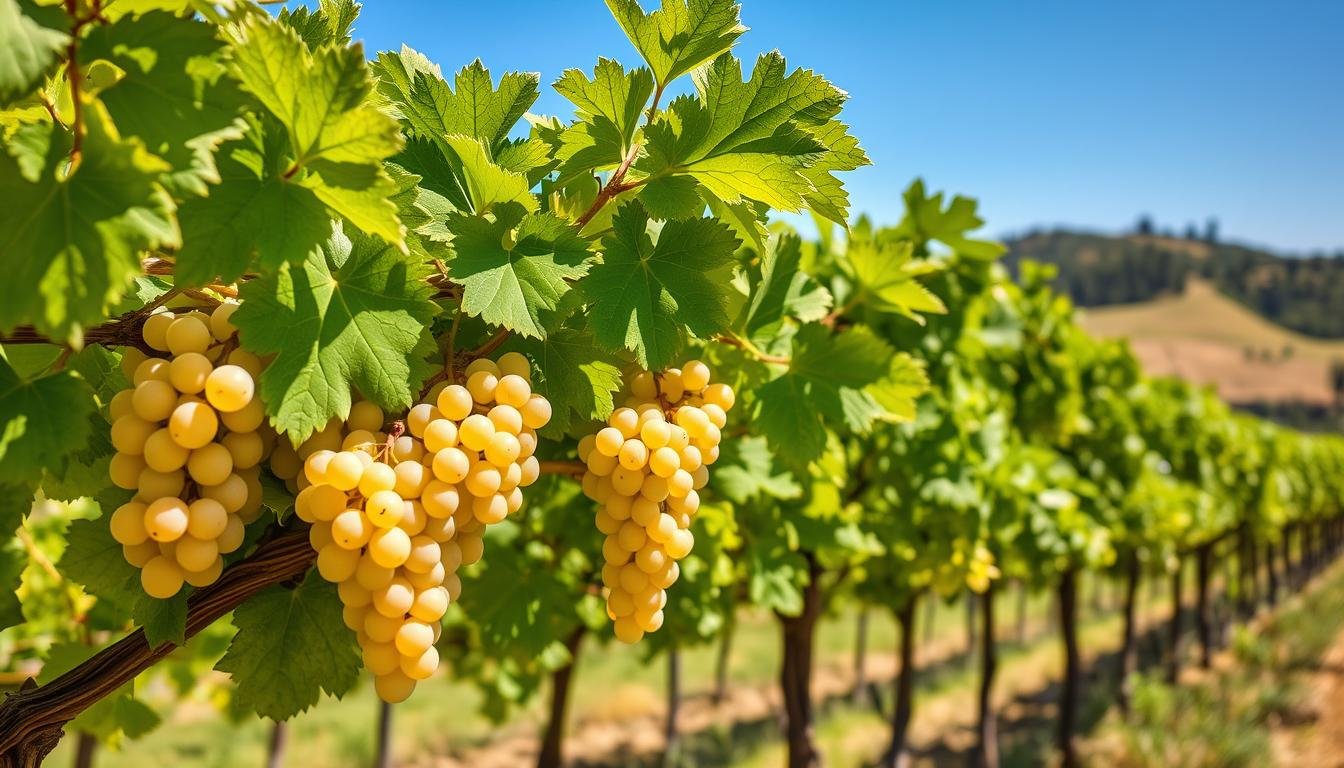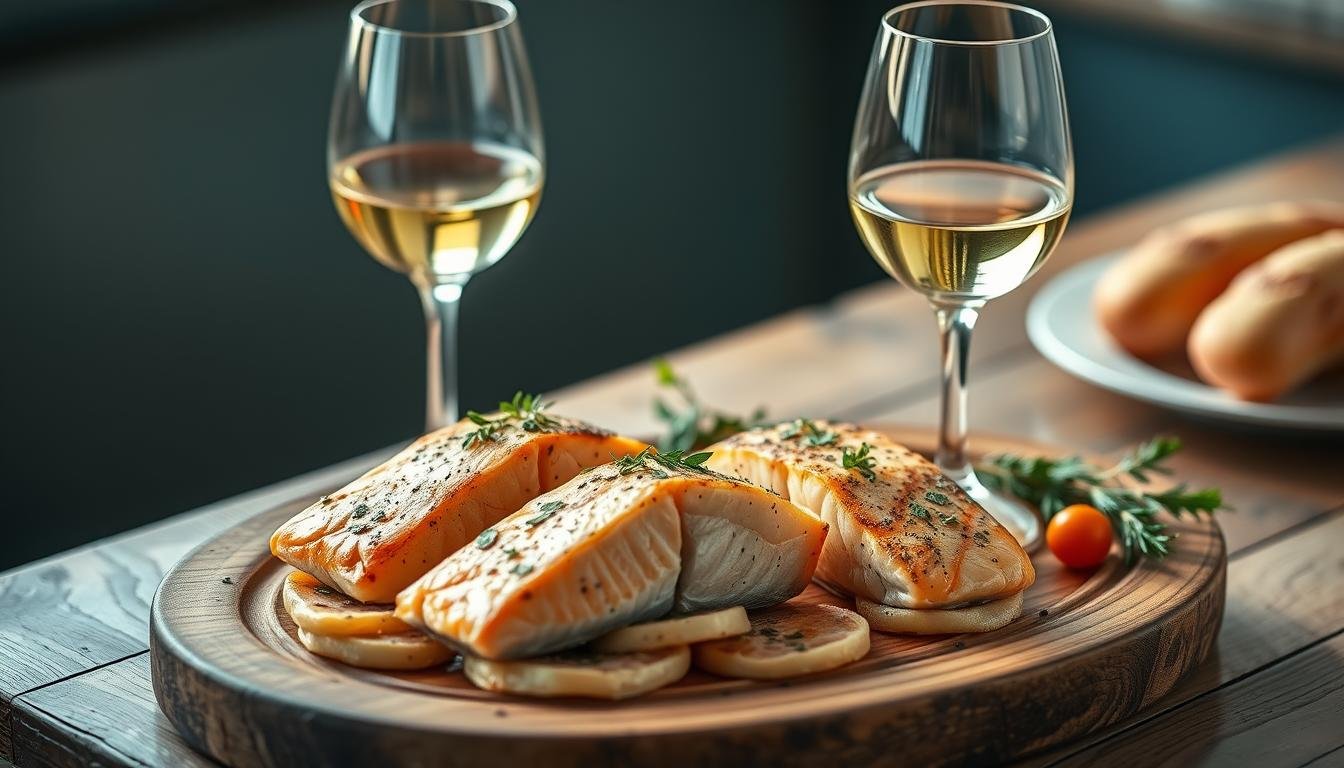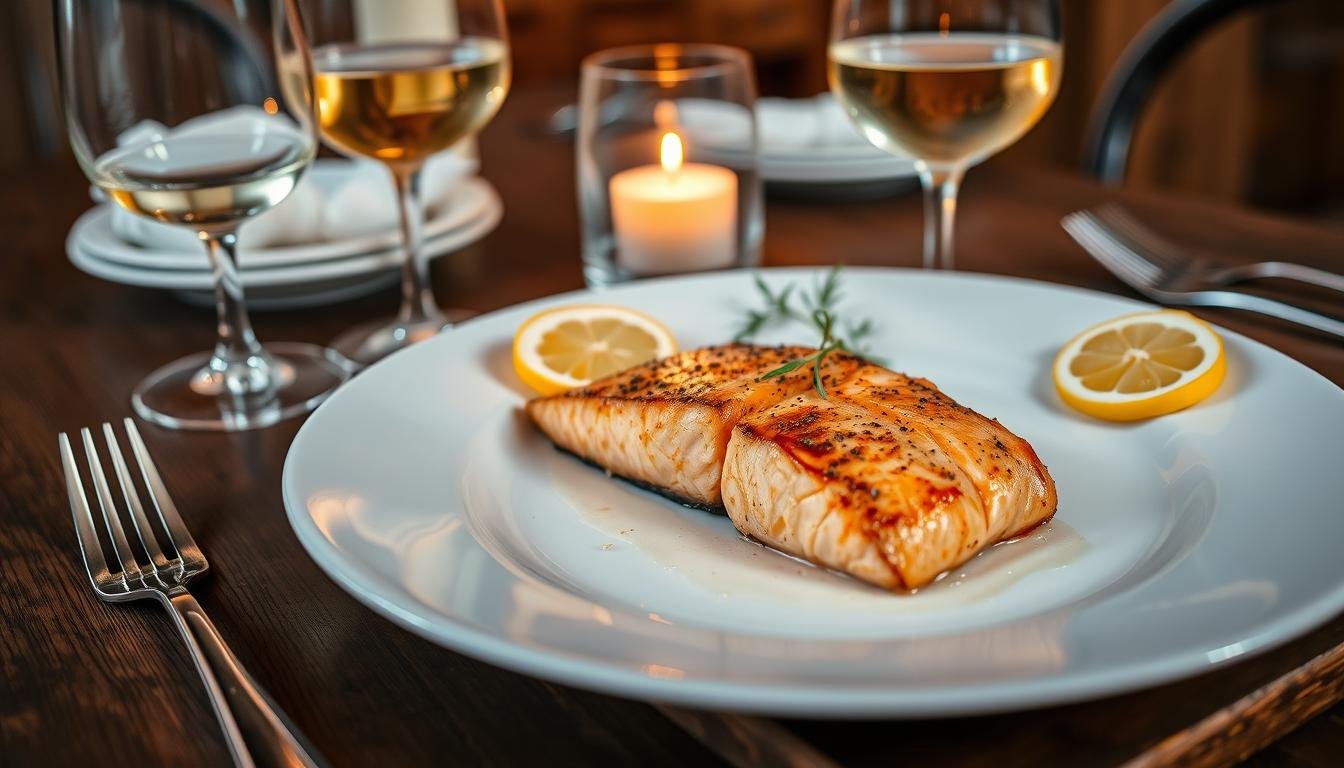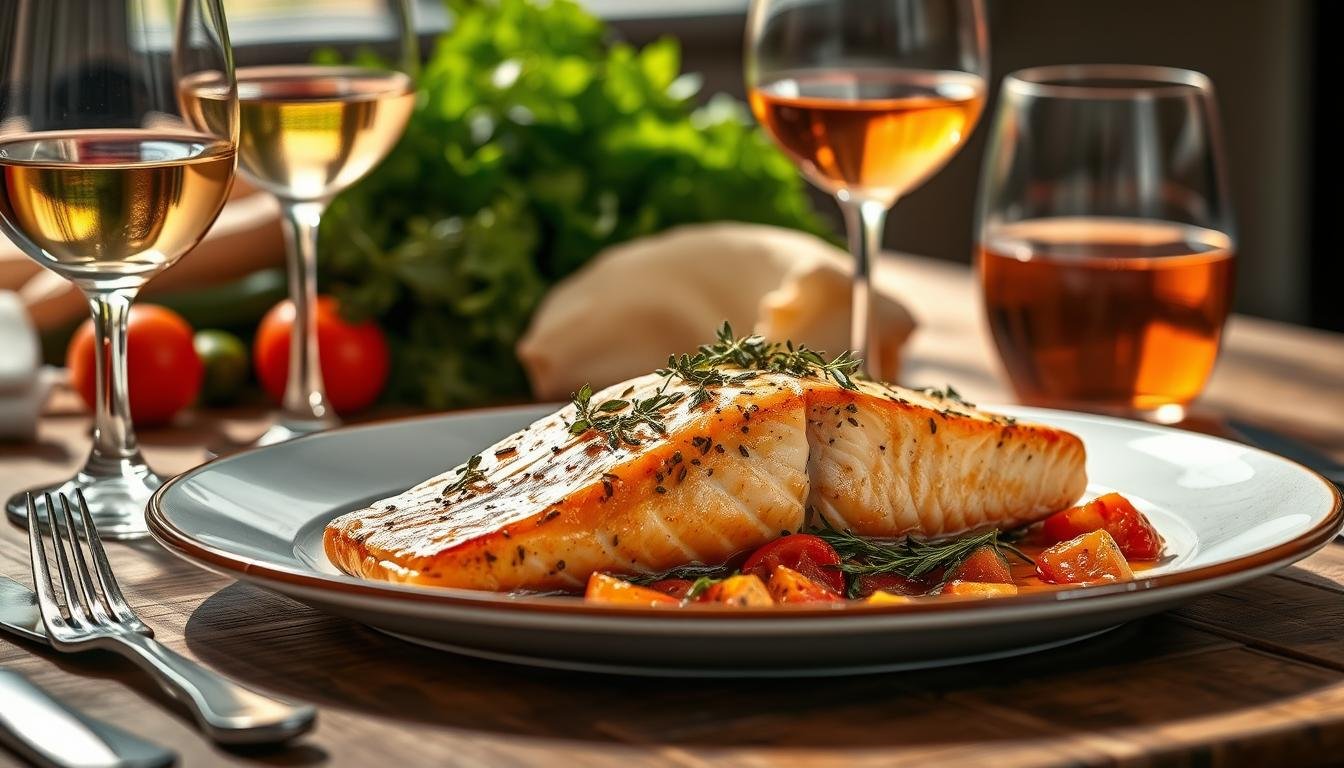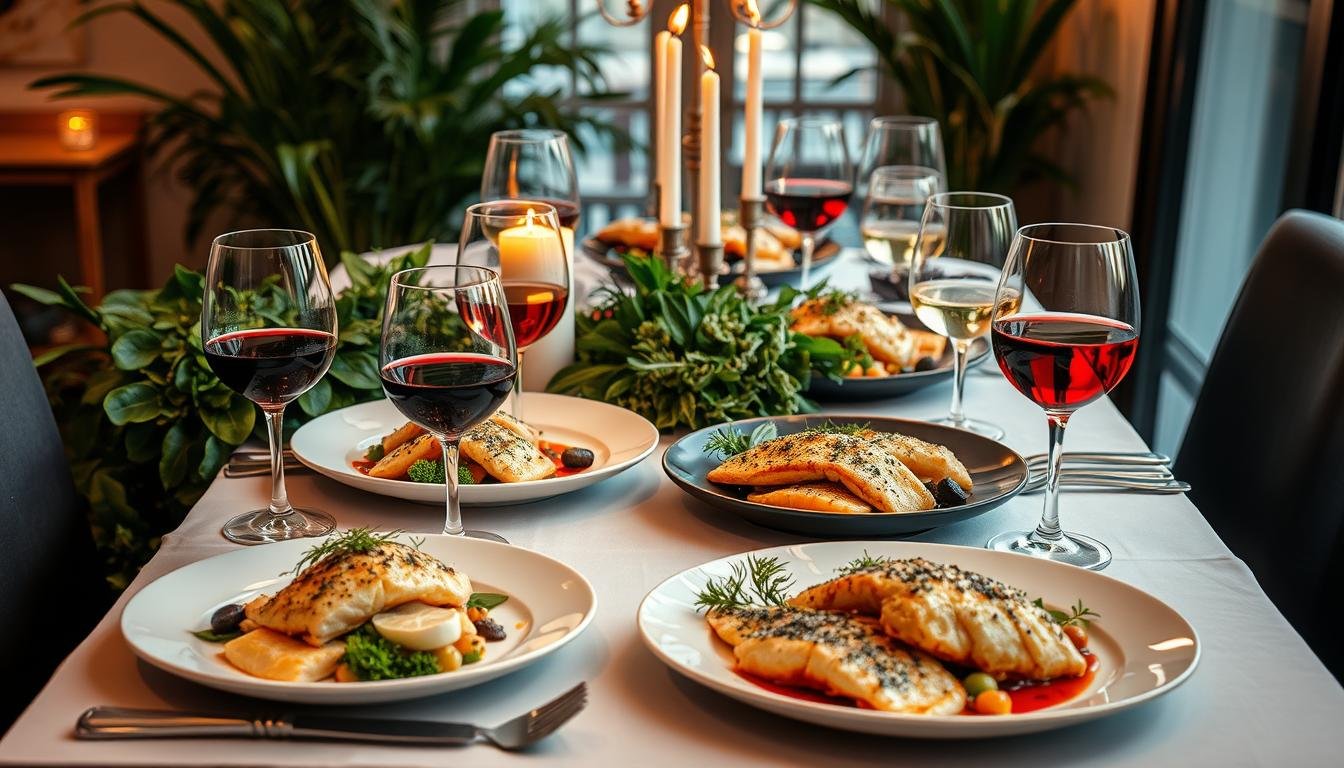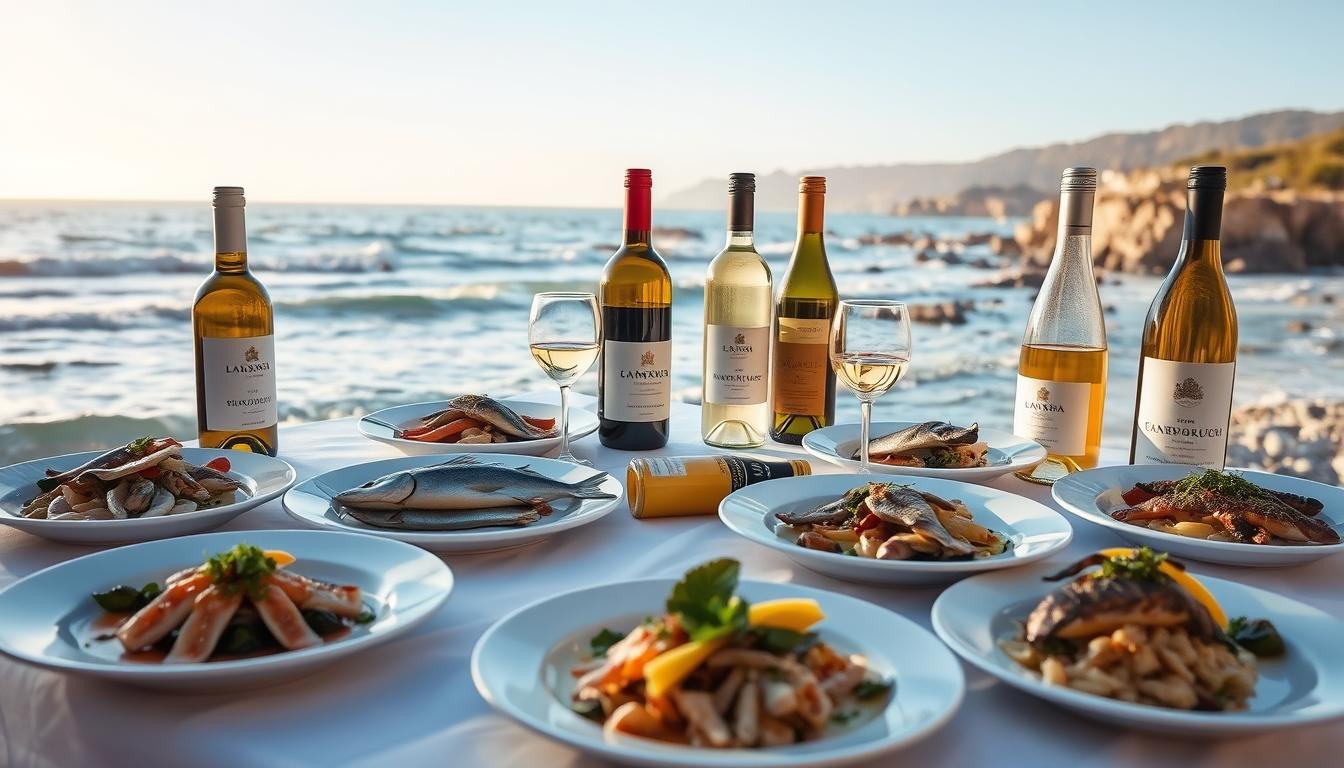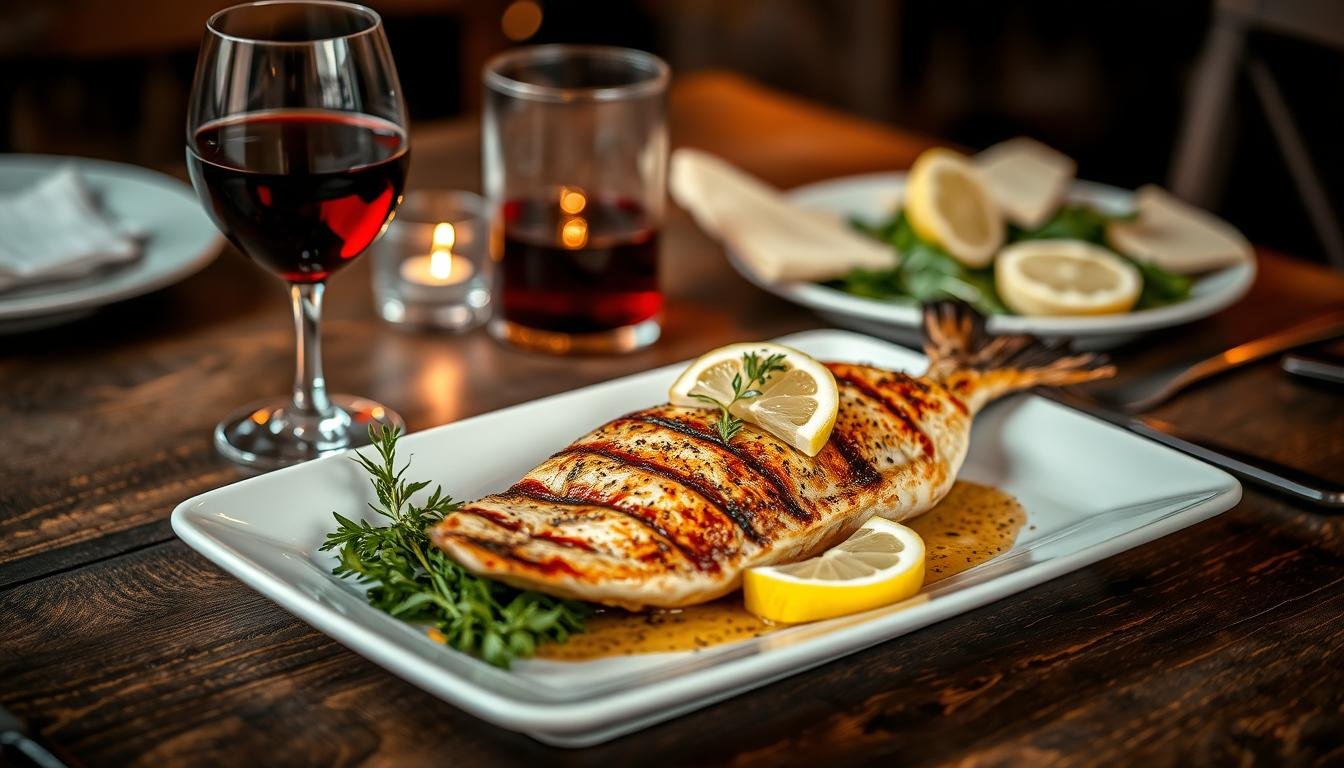As you explore white wine, you’ll find many varieties with unique traits. With over 100 to several hundred types of white wine grape varieties worldwide, choosing can be tough. It’s key to know the different types and their characteristics to find the best white wine.
White wine has a long history, dating back thousands of years. Today, favorites like Chardonnay, Sauvignon Blanc, and Riesling are popular. Chardonnay is especially loved, making up 43% of US wine sales. Whether you prefer a crisp or rich white wine, there’s something for everyone.
Key Takeaways
- There are over 100 to several hundred types of white wine grape varieties worldwide.
- Popular white wine types include Chardonnay, Sauvignon Blanc, and Riesling.
- Chardonnay accounts for 43% of all wine sales in the US market.
- White wine production has a rich history, dating back thousands of years.
- Understanding white wine varieties can help you find the best white wine options for your taste.
- White wine varieties can range from crisp and refreshing to rich and buttery.
Understanding White Wine Varieties: A Primer
Exploring white wine means learning about the grapes used to make it. A guide can help you choose from popular grapes like Chardonnay and Sauvignon Blanc. You’ll also discover grapes like Pinot Grigio and Viognier.
White wines are known for their crisp taste and acidity. This taste comes from the grape and how the wine is made. For example, Chardonnay can taste buttery or citrusy, depending on where it’s made. Sauvignon Blanc is often described as grassy and very acidic.
- Chardonnay: known for its buttery and oaky flavors
- Sauvignon Blanc: characterized by its grassy notes and high acidity
- Pinot Grigio: a crisp and refreshing wine with flavors of lemon and lime
- Viognier: a full-bodied wine with a rich, creamy texture
Knowing about different white wine grapes helps you pick the right one. Whether you want something light and refreshing or rich and full, there’s a wine for you.
| White Wine Varietal | Characteristics |
|---|---|
| Chardonnay | Buttery, oaky, citrusy |
| Sauvignon Blanc | Grassy, high acidity |
| Pinot Grigio | Crisp, refreshing, flavors of lemon and lime |
The Most Popular White Wine Varieties Worldwide
There are many white wine varieties to pick from. California alone grows over 40 types of white wine grapes. But, some popular white wine types really stand out. Chardonnay, Sauvignon Blanc, and Pinot Grigio are favorites for their unique tastes and how well they pair with food.
Some top white wine options are:
- Chardonnay: a buttery and oaky wine with flavors of lemon and apple
- Sauvignon Blanc: a crisp and refreshing wine with citrus and grassy notes
- Pinot Grigio: a light and crisp wine with flavors of green apple and pear
These white wine varieties are loved for their taste and how versatile they are. Whether you’re looking for a wine to go with dinner or to drink alone, there’s a popular white wine type for you. With so many best white wine options out there, it’s fun to try different white wine varieties to find your favorite.
| Wine Variety | Flavor Profile | Pairing Suggestions |
|---|---|---|
| Chardonnay | Buttery, oaky, lemon, apple | Roasted chicken, creamy sauces |
| Sauvignon Blanc | Citrus, grassy, refreshing | Seafood, salads, goat cheese |
| Pinot Grigio | Light, crisp, green apple, pear | Antipasto, seafood, vegetarian dishes |
Chardonnay: The Queen of White Wines
Chardonnay is a full-bodied white wine grape variety. It has low acidity and a full body. Known for its rich and creamy texture, Chardonnay is a favorite among wine lovers. It’s often compared to other full-bodied whites like Sauvignon Blanc and Riesling.
Chardonnay is famous for its buttery and oaky flavors. These come from the fermentation process. The wine’s taste can also change based on where it’s made. Warmer climates make fuller-bodied Chardonnays, while cooler ones are crisper and more acidic.
Oaked vs. Unoaked Chardonnay
Oaked Chardonnay is aged in oak barrels. This gives it flavors of vanilla and caramel. Unoaked Chardonnay, aged in stainless steel tanks, is crisper and more citrusy.
Regional Variations
Chardonnay is made in many places around the world. Each region has its own unique taste. Notable areas include Burgundy, California, and Australia.
Taste Profile and Characteristics
The taste of Chardonnay can differ based on where it’s made and how it’s made. But, it often has a rich, creamy texture. It tastes of butter and vanilla, with a hint of acidity.
| Region | Flavor Profile |
|---|---|
| Burgundy | Minerally and nuanced, with flavors of apple and pear |
| California | Full-bodied and buttery, with flavors of vanilla and caramel |
| Australia | Crisp and citrusy, with flavors of grapefruit and lemon |
Sauvignon Blanc: Fresh and Vibrant
Exploring white wine varieties leads to Sauvignon Blanc, a favorite worldwide. It’s known for its crisp taste and comes from France. Now, it’s loved in many places, making it a top pick for those who like dry and citrusy wines.
Sauvignon Blanc stands out among popular white wine types. It tastes of citrus, tropical fruits, and herbs. This makes it great with seafood, salads, and chicken. Places like Marlborough, New Zealand, and Sancerre, France, add special flavors like grapefruit and passionfruit.
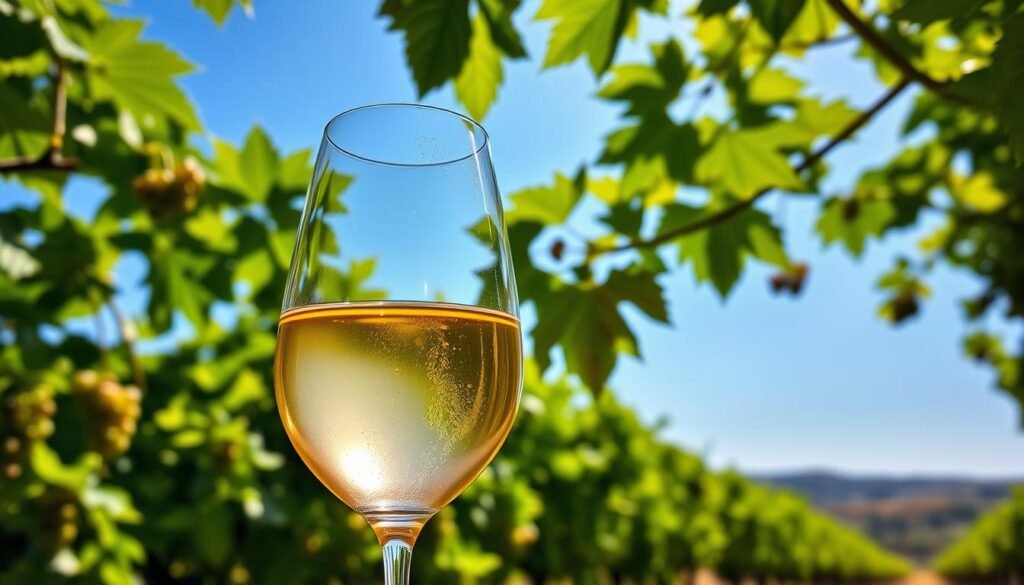
Looking for the best white wine options? Try Sauvignon Blanc from Chile’s Casablanca Valley or South Africa’s Stellenbosch. These areas offer wines that are crisp and fruity, with hints of passionfruit and peach.
Sauvignon Blanc is perfect for those who love refreshing wines. Its high acidity and citrusy taste make it easy to enjoy. With over 4,500 wines online, you’ll find the perfect Sauvignon Blanc for you.
Riesling: From Sweet to Dry
Riesling is a well-liked white wine grape, known for its wide range of sweetness. It can be from dry to sweet. This makes it a key part of any white wine guide. Riesling is among the top white wines, making up about 8.5% of all white grape production.
Riesling is known for its versatility. Its sweetness can vary, from dry to sweet. This variety makes it a great choice for those new to white wines.
- Dry Riesling: has no sugar and is very crisp
- Medium-dry Riesling: has a bit of sugar, making it fruity and refreshing
- Medium-sweet Riesling: has more sugar, perfect for spicy foods and desserts
Riesling is a top white wine, known for its balance of acidity and sweetness. It’s perfect for those who like dry or sweet wines. With its growing popularity in the U.S. and its ability to pair with many foods, it’s a great choice for wine lovers.
| Style | Sweetness Level | Pairing Suggestions |
|---|---|---|
| Dry Riesling | Dry | Seafood, salads |
| Medium-dry Riesling | Off-dry | Asian dishes, creamy cheeses |
| Medium-sweet Riesling | Medium-sweet | Spicy foods, desserts |
Selecting the Perfect White Wine for Your Palate
Choosing the right white wine can be tricky. With so many white wine varieties out there, it’s hard to pick just one. Let’s look at some popular white wine types to make it easier. Dry white wines are crisp and have no sweetness. Sweet white wines, on the other hand, have floral scents and a bit of sweetness.
For beginners, Moscato and Riesling are great choices. They taste fruity and are easy to enjoy. More seasoned wine lovers might like Chardonnay or Sauvignon Blanc. These wines have more complex flavors.
- Acidity: Dry white wines have high acidity, while sweet white wines have lower acidity.
- Flavor profile: White wines can range from crisp and refreshing to rich and buttery.
- Pairing suggestions: White wines can be paired with a variety of dishes, from seafood to spicy food.
Finding the perfect white wine is all about what you like. By looking at the different white wine varieties and popular white wine types, you can choose the best one for you.
| White Wine Variety | Acidity | Flavor Profile | Pairing Suggestions |
|---|---|---|---|
| Chardonnay | Medium | Buttery, oaky | Rich fish, roasted chicken |
| Sauvignon Blanc | High | Crisp, citrusy | Seafood, salads |
| Riesling | High | Floral, fruity | Spicy food, desserts |
Temperature and Serving Guidelines for White Wines
Serving temperature greatly affects the taste of white wine. The best temperature is between 45 to 55°F, depending on the wine type. For instance, Sauvignon Blanc is best at 45°F, while oaked Chardonnay is best at 55°F.
It’s crucial to keep white wines cool and dark. The best storage temperature is 45 to 50°F. Chill the wine in the fridge for 30 minutes before serving.
Here are some serving guidelines for white wines:
- Light whites, such as Sauvignon Blanc and Pinot Gris: 45-50°F
- Full-bodied whites, such as Chardonnay and Marsanne-Roussane: 50-55°F
- Rosé wines: 45-55°F
- Sparkling wines: 40-50°F
Knowing the white wine flavor profiles and white wine types comparison helps in choosing the right temperature. This way, you can fully enjoy the white wine tasting notes and all the flavors and aromas.
| Wine Type | Ideal Serving Temperature |
|---|---|
| Sauvignon Blanc | 45°F |
| Oaked Chardonnay | 55°F |
| Rosé | 45-55°F |
| Sparkling Wine | 40-50°F |
By following these guidelines and understanding each wine’s unique characteristics, you can enhance your white wine experience. Enjoy the full range of flavors and aromas these wines offer.
Food Pairing Fundamentals for White Wine Varieties
Choosing the right white wine varieties to pair with food can be tough. But, knowing the basics of food pairing can guide you. Since 82% of people think wine should go well with food, it’s key to match the wine’s traits with the dish.
Start by looking at the wine’s acidity and taste. For instance, wines like Sauvignon Blanc and Pinot Grigio are perfect for fatty foods because of their high acidity. Meanwhile, Chardonnay, being fuller-bodied, pairs well with heavier meals.
Here are some top pairing ideas for white wine varieties:
- Seafood: Go for wines like Sauvignon Blanc or Pinot Grigio for their high acidity.
- Salads: Choose crisp wines like Pinot Grigio or Sauvignon Blanc for a refreshing taste.
- Poultry: Richer wines like Chardonnay work well with poultry.
Remember, the secret to great pairings is to keep trying and finding what you like. With a bit of practice, you’ll get better at matching white wine varieties with your favorite foods.

Understanding White Wine Labels and Terminology
When picking a white wine, the label is key. It offers valuable info. Knowing the terms and details on the label helps you choose wisely. Different grapes, like Chardonnay and Sauvignon Blanc, give unique tastes.
A guide to white wines can help you find the right one. Popular varieties, such as Riesling and Pinot Grigio, have special traits. They match well with many foods. Look for grape variety, vintage, and region on the label. These details affect the wine’s taste and quality.
Important terms on wine labels include “dry” and “oaked.” “Dry” means little sugar, and “oaked” means aged in oak barrels. Knowing these terms helps you understand the wine better. Whether you’re new to white wine or a seasoned lover, grasping wine labels and terms improves your experience.
Emerging Trends in White Wine Production
As you explore white wine, you’ll see a move towards sustainable and organic production. This change comes from people wanting eco-friendly and health-conscious choices. Winemakers are now using less water and more solar power.
Popular white wines like Albariño, Grüner Veltliner, and Vermentino are becoming more popular. These white wine varieties offer unique tastes and appeal to those seeking new experiences. For the best white wine options, look for wines from lesser-known grapes.
Here are some emerging trends in white wine production:
- Natural and organic wines are on the rise, driven by consumer demand for health-conscious and eco-friendly products.
- Rosé wines are now enjoyed year-round, reflecting a shift in consumption patterns.
- The low and alcohol-free wine segment is expanding, catering to consumers who prefer lower-alcohol options.
The wine industry is changing, with more sustainable practices in white wine production. With growing interest in white wine varieties and popular white wine types, winemakers are creating high-quality, unique wines. These meet the changing tastes of consumers.
| White Wine Variety | Characteristics | Pairing Suggestions |
|---|---|---|
| Albariño | Citrus, stone fruit, and floral notes | Seafood, salads, and spicy dishes |
| Grüner Veltliner | Mineral, white pepper, and green apple notes | Vegetarian dishes, fish, and Asian cuisine |
| Vermentino | Herbal, citrus, and stone fruit notes | Seafood, poultry, and Mediterranean dishes |
Budget-Friendly White Wine Recommendations
Enjoying white wine doesn’t have to cost a lot. There are many affordable options that let you explore different white wine flavor profiles without spending too much. Here are some budget-friendly white wines to consider.
Choosing a budget-friendly white wine starts with knowing the white wine types comparison. For instance, Chardonnay and Sauvignon Blanc have unique tastes. Chardonnay is versatile, while Sauvignon Blanc is fresh and lively. This helps you pick a wine that fits your taste.
Look for wines from New Zealand and Italy for great value. New Zealand’s Sauvignon Blanc is known for its citrus and grassy flavors. Italian whites, like Pinot Grigio and Gavi, are crisp with green apple and stone fruit tastes. When looking at white wine tasting notes, think about the region and grape to find the right wine for you.
Here are some hidden gems under $20:
- Picpoul de Pinet: A French white wine with flavors of citrus and floral notes
- Freeman’s Bay New Zealand Pinot Gris: A rich and flavorful wine with notes of pear and spice
- Gavi: An Italian white wine with crisp acidity and flavors of green apple and stone fruit
Should you splurge or save on wine? While there are many affordable choices, some moments call for a pricier wine. Think about the occasion and your budget to decide. With these budget-friendly white wines, you can enjoy a great bottle without spending a lot.
| Wine | Region | Price |
|---|---|---|
| Picpoul de Pinet | France | $12 |
| Freeman’s Bay New Zealand Pinot Gris | New Zealand | $15 |
| Gavi | Italy | $10 |
Conclusion
Exploring white wine is exciting. Knowing the different types can make your tasting experience better. With so many white wines out there, you can find the perfect one for you.
White wines range from crisp and refreshing to rich and buttery. Sauvignon Blanc is great for seafood, while Chardonnay pairs well with roasted chicken. There’s a white wine for every taste and occasion.
Consider serving temperature, food pairings, and where the wine comes from. This will help you enjoy white wine even more. So, start exploring and find your new favorite white wine.

